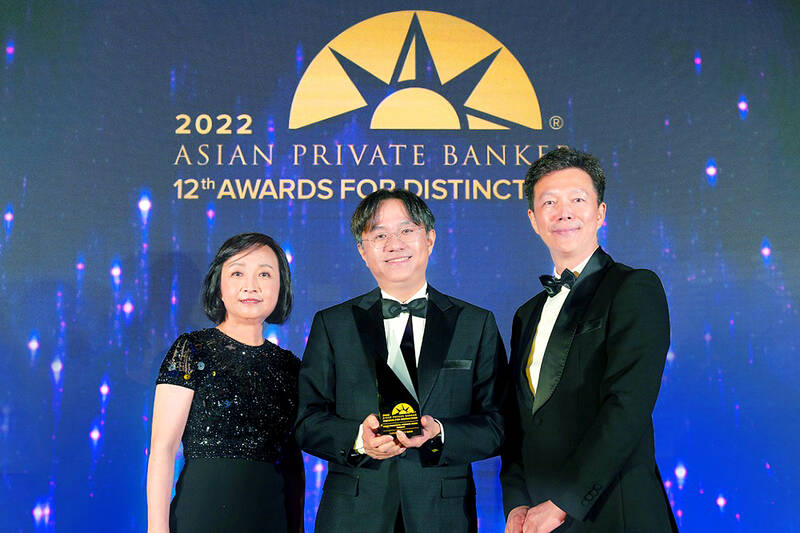In August last year, the Financial Supervisory Commission (FSC) allowed banks to engage in wealth management business for high-asset clients to invest in non-Securities Investment Trust (non-SIT) offshore funds. Starting from this year’s first quarter, Cathay United Bank (CUB) launched the very first non-SIT offshore funds in Taiwan.
For four consecutive years, CUB has been awarded the Best Domestic Private Bank in Taiwan by Asian Private Banker for its excellence in private banking and became the only bank in Taiwan to receive this prestigious accolade.
Unlike traditional investment methods, non-SIT offshore funds allow various channels of investment, including private equity funds and other alternative investments. CUB has provided its clients with numerous investment plan options to arrange and allocate their assets.

Photo: courtesy of Cathay United Bank
According to Fu Po-Sheng (傅伯昇), the CEO of the Cathay United Bank Private Banking, the bond stock and relevant bond markets have continued to be volatile due to the ongoing dual impact of inflation and interest rate hikes. Alternative ways of investment are less affected by the fluctuations in publicly traded market prices such as stocks and bonds, thereby achieving portfolio diversification that reduces investment risk. With diverse strategies, alternative investments can hedge against inflation while pursuing Alpha investment returns. Even with rising interest rates, alternative investments can maintain a robust performance in helping clients to maximize returns.
CUB has established collaborative relationships with a number of world-famous asset management companies. According to Fu, we are now confronted by the global tightening of money supply and slowing economic growth, and so it is crucial to construct investment portfolios for high-asset clients that can reduce risk in traditional equities and bonds. Cathay United Bank Private Banking continues to devote itself to planning alternative ways of investment, designing financial products such as private equity funds to cater to the needs of high-asset clients. CUB’s mission is to offer comprehensive financial market instruments and asset allocation solutions catering to clients’ needs.

TRADE WAR: Tariffs should also apply to any goods that pass through the new Beijing-funded port in Chancay, Peru, an adviser to US president-elect Donald Trump said A veteran adviser to US president-elect Donald Trump is proposing that the 60 percent tariffs that Trump vowed to impose on Chinese goods also apply to goods from any country that pass through a new port that Beijing has built in Peru. The duties should apply to goods from China or countries in South America that pass through the new deep-water port Chancay, a town 60km north of Lima, said Mauricio Claver-Carone, an adviser to the Trump transition team who served as senior director for the western hemisphere on the White House National Security Council in his first administration. “Any product going

TECH SECURITY: The deal assures that ‘some of the most sought-after technology on the planet’ returns to the US, US Secretary of Commerce Gina Raimondo said The administration of US President Joe Biden finalized its CHIPS Act incentive awards for Taiwan Semiconductor Manufacturing Co (TSMC, 台積電), marking a major milestone for a program meant to bring semiconductor production back to US soil. TSMC would get US$6.6 billion in grants as part of the contract, the US Department of Commerce said in a statement yesterday. Though the amount was disclosed earlier this year as part of a preliminary agreement, the deal is now legally binding — making it the first major CHIPS Act award to reach this stage. The chipmaker, which is also taking up to US$5 billion

High above the sparkling surface of the Athens coastline, the cranes for building the 50-floor luxury tower centerpiece of Greece’s future “smart city” look out over the Saronic Gulf. At their feet, construction machinery stirs up dust. Its backers say the 8 billion euro (US$8.43 billion) project financed by private funds is a symbol of Greece’s renaissance after the years of financial stagnation that saw investors flee the country. However, critics see it more as a future “ghetto for the rich.” It is hard to imagine that 10km from the Acropolis, a new city “three times the size of Monaco”

STRUGGLING BUSINESS: South Korea’s biggest company and semiconductor manufacturer’s buyback fuels concerns that it could be missing out on the AI boom Samsung Electronics Co plans to buy back about 10 trillion won (US$7.2 billion) of its own stock over the next year, putting in motion one of the larger shareholder return programs in its history. South Korea’s biggest company would repurchase the stock in stages over the coming 12 months, it said in a regulatory filing on Friday. As a first step, it would buy back about 3 trillion won of paper starting today up until February next year, all of which it would cancel. The board would deliberate on how best to effect the remaining 7 trillion won of buybacks. The move